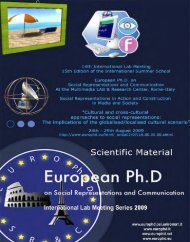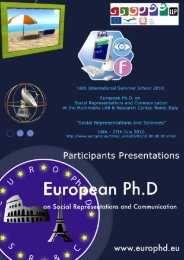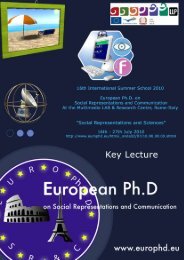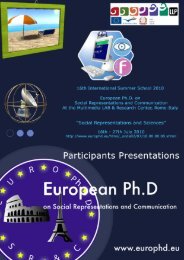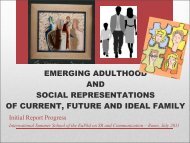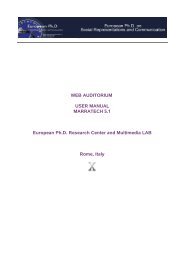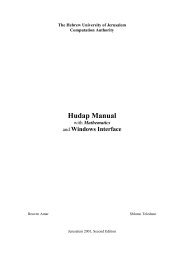The "boomerang" effect of the radicalism in discourse analysis
The "boomerang" effect of the radicalism in discourse analysis
The "boomerang" effect of the radicalism in discourse analysis
Create successful ePaper yourself
Turn your PDF publications into a flip-book with our unique Google optimized e-Paper software.
Sherrard, 1991; Marks, 1993, Figueroa & Lopez, 1991; Parker & Burman, 1993; Parker,<br />
1994). In particular Parker and Burman (1993) have produced an almost complete<br />
<strong>in</strong>ventory <strong>of</strong> problems (at times <strong>of</strong> more general range, and consequently applicable also to<br />
o<strong>the</strong>r social science paradigms) identify<strong>in</strong>g a good thirty-two problems with <strong>discourse</strong><br />
<strong>analysis</strong>.<br />
Among <strong>the</strong>se, various substantial problems deal not only with <strong>the</strong> practice <strong>of</strong> research<br />
<strong>in</strong> this field, but with <strong>the</strong> transmission <strong>of</strong> <strong>the</strong> competence <strong>of</strong> <strong>the</strong> analysts to new possible<br />
analysts. In fact, if it is assumed that <strong>the</strong> mean<strong>in</strong>gs <strong>of</strong> <strong>the</strong> <strong>discourse</strong> are fluctuat<strong>in</strong>g <strong>in</strong> <strong>the</strong><br />
discursive relations, bound <strong>in</strong> time and space to contexts <strong>in</strong> which <strong>the</strong> <strong>discourse</strong> is<br />
produced, <strong>in</strong> a radically relativist and anti-essentialist perspective, which codes will an<br />
analyst be able to use for trac<strong>in</strong>g <strong>the</strong> "mean<strong>in</strong>gs" that are not yet <strong>the</strong>mselves <strong>in</strong> <strong>the</strong><br />
discursive act ? <strong>The</strong> self-referr<strong>in</strong>g perspective <strong>of</strong> <strong>the</strong> RDA should lead as extreme<br />
consequence to <strong>the</strong> annulment <strong>of</strong> any code that has not already been immanent to <strong>the</strong><br />
discursive situation and, <strong>the</strong>refore, self-evident. O<strong>the</strong>rwise one falls <strong>in</strong>to a duplicity <strong>of</strong><br />
levels between <strong>the</strong> "visible" and <strong>the</strong> "<strong>in</strong>visible", <strong>the</strong> "conscious" and <strong>the</strong> "unconscious",<br />
which reproduces an hermeneutic horizon that recalls ra<strong>the</strong>r <strong>the</strong> epistemology <strong>of</strong> <strong>the</strong><br />
knowledge elaborated by psycho<strong>analysis</strong> (that not by chance has elaborated, toge<strong>the</strong>r with<br />
<strong>the</strong> conceptual systems that act as <strong>in</strong>terpretative codes, also <strong>the</strong> practical specifications for<br />
<strong>the</strong> tra<strong>in</strong><strong>in</strong>g <strong>of</strong> future psychoanalysts).<br />
<strong>The</strong> discursive immantentism specific to <strong>the</strong> RDA would appear to exclude this<br />
duplicity <strong>of</strong> levels. And yet it is no mystery that precisely to <strong>the</strong> psychoanalytical<br />
<strong>in</strong>terpretative code several among <strong>the</strong> most renowned exponents <strong>of</strong> <strong>discourse</strong> <strong>analysis</strong> reapply<br />
<strong>the</strong>mselves for re-read<strong>in</strong>g (or better de-construct<strong>in</strong>g) <strong>the</strong> <strong>discourse</strong>s, but also for <strong>the</strong><br />
practice <strong>of</strong> reflexivity and <strong>of</strong> <strong>the</strong> “grounded <strong>analysis</strong>” on <strong>the</strong> <strong>in</strong>stitutional side.<br />
Emblematic <strong>in</strong> this respect is <strong>the</strong> de-constructive <strong>analysis</strong> that Parker (1994) proposes<br />
<strong>in</strong> a key-document <strong>of</strong> <strong>the</strong> British Psychological Society, namely <strong>The</strong> Future <strong>of</strong> <strong>the</strong><br />
Psychological Sciences: Horizons and Opportunities for British Psychology (BPS, 1988).<br />
He warns that <strong>the</strong> adoption <strong>of</strong> <strong>the</strong> conceptual categories and <strong>of</strong> <strong>the</strong> psychoanalytical<br />
term<strong>in</strong>ology (<strong>the</strong> ego versus id; work<strong>in</strong>g through versus act<strong>in</strong>g out, stages <strong>of</strong> development<br />
versus polymorphous perversity) does not signify any presupposition <strong>of</strong> processes at<br />
<strong>in</strong>dividual level and may be used only "to capture <strong>the</strong>se discursive forms, with<strong>in</strong> <strong>the</strong><br />
collective, and <strong>the</strong>n position <strong>in</strong>dividuals as subjects" (Parker, 1994, p. 247). Never<strong>the</strong>less,<br />
it is obvious that <strong>the</strong> borrow<strong>in</strong>g <strong>in</strong> itself <strong>of</strong> a term<strong>in</strong>ology specific to <strong>the</strong> psychoanalytical<br />
<strong>the</strong>ory (<strong>discourse</strong>?) or <strong>the</strong> de-construct<strong>in</strong>g <strong>of</strong> <strong>the</strong> <strong>in</strong>stitutional <strong>discourse</strong> implied <strong>in</strong> <strong>the</strong> BPS<br />
document, confirms <strong>the</strong> need that <strong>in</strong> order to analyse a <strong>discourse</strong> reference must be made to<br />
ano<strong>the</strong>r <strong>discourse</strong>, which requires for its decod<strong>in</strong>g <strong>the</strong> possession <strong>of</strong> a code and that,<br />
accord<strong>in</strong>gly, a mean<strong>in</strong>g <strong>of</strong> <strong>the</strong> <strong>discourse</strong> cannot do o<strong>the</strong>rwise than refer back to o<strong>the</strong>r<br />
mean<strong>in</strong>gs and never be entirely self-referential.<br />
For <strong>the</strong> same reason, <strong>the</strong> concepts <strong>of</strong> "false conscience" and <strong>of</strong> "ideology" elaborated<br />
from <strong>the</strong> hegelian-marxist tradition, do not seem applicable, at least <strong>in</strong> <strong>the</strong> notion <strong>of</strong> "true"<br />
and "false" negated at <strong>the</strong> start by socio-constructionism.<br />
15




